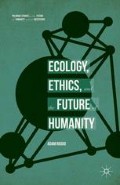Abstract
Living with ecological consciousness requires a moral change, but fundamental changes in morality will not take root in us unless we fundamentally change our entire self-conception. The rest of the book will map this profound ethical task. The foundational step is building a framework to understand reality in terms of interdependence and mutual reliance. Ecology is unusual among the sciences in that it offers a concrete and unambiguous lesson about the nature of reality. Ecology is the science of relationships among dynamisms at the scale of human existence, relationships that demonstrate the interdependence of bodies in the world. The primary principles of ecology are that no body can exist in isolation because its generation and continued existence depends on its relations with bodies that share its history, and that those relations constitute its singular identity (Næss, 1989, p. 49). This scientific lesson is also a moral lesson in that it informs the practice of daily life. The interdependence of bodies for their own and others’ existences teaches that all concerns are integrated. Consider the relationships of predator and prey, the most colloquially common example to illustrate ecological dynamics. Even though the members of one group kill and eat the members of another to survive, each population depends on the other to thrive: catastrophic collapse of prey populations result in starvation of predators, and catastrophic collapse of predator populations lead to prey populations overconsuming their resources and starving later. More directly beneficial relationships, such as that of a human and her gut flora ecosystems, are more striking examples of interdependence.
Access this chapter
Tax calculation will be finalised at checkout
Purchases are for personal use only
Preview
Unable to display preview. Download preview PDF.
Copyright information
© 2015 Adam Riggio
About this chapter
Cite this chapter
Riggio, A. (2015). The Essence of an Ecological Philosophy. In: Ecology, Ethics, and the Future of Humanity. Palgrave Studies in the Future of Humanity and Its Successors. Palgrave Macmillan, New York. https://doi.org/10.1057/9781137536235_5
Download citation
DOI: https://doi.org/10.1057/9781137536235_5
Publisher Name: Palgrave Macmillan, New York
Print ISBN: 978-1-349-55916-9
Online ISBN: 978-1-137-53623-5
eBook Packages: Palgrave Religion & Philosophy CollectionPhilosophy and Religion (R0)

